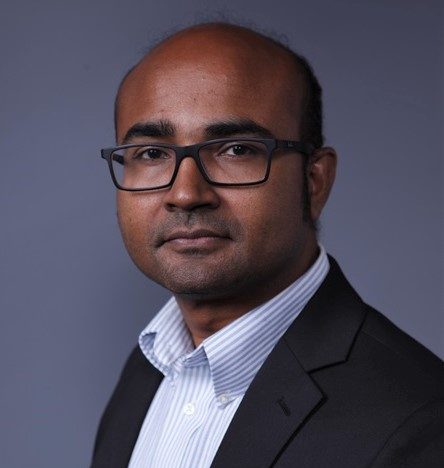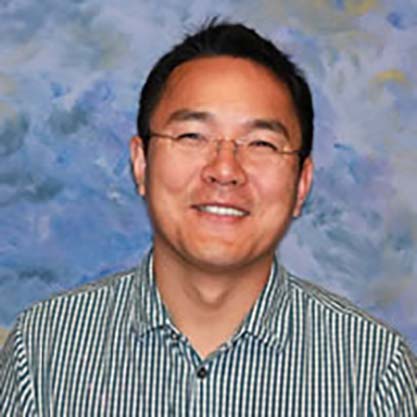Texas A&M AgriLife scientists’ high-impact work earns Chancellor’s recognition
EDGES Fellowships invest in mid-career faculty who are making a difference
Three of the 13 distinguished faculty members from across Texas A&M University recognized as 2021 Chancellor’s Enhancing Development and Generating Excellence in Scholarship, EDGES, Fellows are affiliated with Texas A&M AgriLife and the College of Agriculture and Life Sciences.

Recognized from the College of Agriculture and Life Sciences was Muthukumar Bagavathiannan, Ph.D., an associate professor in the Department of Soil and Crop Science.
Additionally, Wendy Jepson, Ph.D., a professor in the Department of Geography, is also associate director for the Texas Water Resources Institute at the Texas A&M AgriLife Research and Extension Center at Dallas. And Wenshe Liu, Ph.D., is a professor affiliated with the Department of Biochemistry and Biophysics and director of the Texas A&M Drug Discovery Lab.
The fellowships — which come with more than $7.7 million in funding across the 13 faculty — are an investment by The Texas A&M University System to recruit and retain world-class faculty, said Chancellor John Sharp, in making the announcement.
Sharp launched the EDGES Fellowship in 2019 to honor and boost mid-career faculty at the associate or early full professor ranks who are making significant marks in their disciplines. The recognition highlights The Texas A&M System’s focus on supporting, retaining and recognizing faculty with substantial and sustained accomplishments and the promise of continued high-impact scholarship.
“These individuals are exceptional scientists,” said Patrick J. Stover, Ph.D., vice chancellor for Texas A&M AgriLife, dean of the Texas A&M College of Agriculture and Life Sciences and director of Texas A&M AgriLife Research. “They have made impressive contributions to their fields of study and have established themselves as leaders among their peers with their multidisciplinary research at AgriLife.”
Bagavathiannan digs into weeds
Bagavathiannan joined the Department of Soil and Crop Sciences as a tenure-track weed science faculty member in 2014 with a Texas A&M AgriLife Research appointment. He has since established a rigorous research group that is gaining national and international recognition in weed science research.
Bagavathiannan earned an agriculture and agronomy bachelor’s and master’s degree from the Tamil Nadu Agricultural University in Coimbatore, India. Additionally, he earned a master’s in plant genetic manipulation from the University of Nottingham, Sutton Bonington, England and a doctorate in weed ecology from the University of Manitoba, Winnipeg, Canada.
With research interests in the broader area of weed science and agronomy, his particular emphasis is on weed ecology and management. With the threat of herbicide-resistant weeds, his research program aims to understand the evolutionary biology and dynamics of herbicide resistance in weed communities and develop integrated weed management solutions for effectively targeting weed seedbanks. Notably, his program utilizes digital technologies in precision weed detection, management and ecology.
Bagavathiannan leads a multi-state National Institute of Food and Agriculture, NIFA, Specialty Crop Research Initiative-funded research project on annual bluegrass management; a Beltwide Palmer amaranth seedbank management project funded by Cotton Incorporated; a project investigating gene flow between sorghum and Johnson grass funded by NIFA-Biotechnology Risk Assessment Research Grants Program and USDA-ARS; a harvest-weed seed-control project funded by the NIFA-AFRI Foundational program; a weed-resistance management decision-support tool development funded by the Crop Protection and Pest Management program; and an organic cotton project funded by the NIFA-ORG program.
Bagavathiannan was recognized with the Early Career Outstanding Scientist Award by the Weed Science Society of America in 2020. He is also a recipient of the Dean’s Outstanding Early Career Research Award and the Vice Chancellor’s Outstanding Early Career Research Award from the College of Agriculture and Life Sciences.

Jepson focuses on urban water sustainability
Jepson joined Texas A&M’s Department of Geography in 2003, where she focused on the political, economic and social causes of environmental inequities of household water security in Texas and urban Brazil.
She has been the co-lead on the $1.5 million Texas A&M University Presidential Excellence Grant “Pathways to Sustainable Urban Water Security.”
She is passionate about creating innovative approaches to community-involved research and engaging a broader base of constituencies, including organizations, civil society, communities and stakeholders. She sees her position as the associate director of the Texas Water Resources Institute in Dallas, a unit of Texas A&M AgriLife, as a unique opportunity to pursue these efforts.
Jepson said it provides an opportunity to build the research vision on urban water sustainability. The Texas A&M AgriLife Center in Dallas is a dynamic urban environment, which means AgriLife Research and Texas A&M AgriLife Extension Service are well-positioned to leverage their resources and advance the developing field of sustainable urban systems science to better serve Texans’ diverse needs.
In 2015, she received the American Association of Geographers Enhancing Diversity Award for her efforts to achieve equality and inclusion within the field and is a current fellow in the Dean of Faculties’ ADVANCE program designed to advance faculty diversity, inclusion and success.
She leads the National Science Foundation-funded Household Water Insecurity Experiences – Research Coordination Network and serves as book series editor for Water and Society, a new initiative by Johns Hopkins University Press and Associate Editor for WIRES Water.
Liu leads charge against COVID-19 pandemic
In addition to serving as director of the Texas A&M Drug Discovery Laboratory in the Department of Chemistry, Liu is affiliated with the Department of Biochemistry and Biophysics, the Department of Molecular & Cellular Medicine, the Department of Translational Medical Sciences and the Institute of Biosciences and Technology.
In recent years, Liu has concentrated his efforts on developing effective treatments for patients with COVID-19, including remdesivir, use of the FDA-approved heart medication bepridil and most recently MP18. His research is supported by Texas A&M Presidential Impact Fellow funds through the Texas A&M Drug Discovery Laboratory.
In addition to being a 2018 Presidential Impact Fellow, Liu is the holder of the Gradipore Chair in Chemistry. He joined the Texas A&M Department of Chemistry faculty in 2007 after earning his doctorate in chemistry at the University of California, Davis in 2005. He completed two years of postdoctoral study in chemical biology at Scripps Research Institute prior to coming to Texas A&M.



